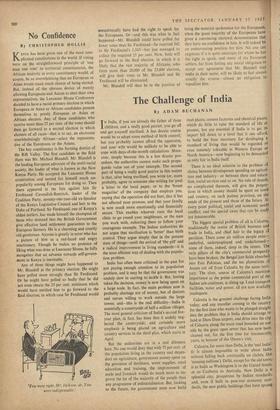No Confidence
By CHRISTOPHER HOLLIS
KENYA has been given one of the most com- plicated constitutions in the world. If voting were on the straightforward principle of 'one man one vote' in territorial constituencies, the African majority in every constituency would, of course, be so overwhelming that no European or Asian would stand much chance of being elected. But, instead of the obvious device of merely allowing Europeans and Asians to elect their own representatives, the Lancaster House Conference decided to have a racial primary election in which European or Asian or African candidates present themselves to purely European or Asian or African electors. Any of these candidates who receive more than 25 per cent. of the votes should then go forward to a second election in which electors of all races—that is to say, an electorate overwhelmingly African—select the representa- tive of the Europeans or the Asians.
The key constituency is the farming district of the Rift Valley. The first candidate in the field there was Mr. Michael Blundell. Mr. Blundell is the leading European advocate of the multi-racial society, the leader of what is known as the New Kenya Party. He accepted the Lancaster House constitution and earned for himself much un- popularity among Europeans for doing so. Then there appeared in the lists against him Sir Ferdinand Cavendish-Bentinck, leader of the Coalition Party, seventy-one-year-old ex-Speaker of the Kenya Legislative Council and heir to the Duke of Portland. Sir Ferdinand, one of Kenya's oldest settlers, has made himself the champion of those who demand that the British Government give effective land settlement guarantees to the European farmers. He is a charming and courtly old gentleman. Anyone is greatly in error who has a picture of him as a red-faced and angry reactionary. Though he makes no pretence of liking what was done at Lancaster House, he fully recognises that an advance towards self-govern- ment in Kenya is inevitable.
Any of three things might have happened to Mr. Blundell at the primary election. He might have polled more strongly than Sir Ferdinand.
Or he might have polled so badly that he did not even obtain the 25 per cent. minimum which would have entitled him to go forward to the final election; in which case Sir Ferdinand would 'You were right, Mr. Jackson, sir. You were indispensable.' unequivocally have had the right to speak for the Europeans. Or—and this was what in fact happened—Mr. Blundell could have polled far fewer votes than Sir Ferdinand—he received 542 to Sir Ferdinand's 1,545—but just managed to cone& the required 25 per cent. Now, both will go forward to the final election, in which it is likely that the vast majority of Africans, who form more than 20,000 of the 23,000 electors, will give their votes to Mr. Blundell and Sir Ferdinand will be eliminated.
Mr. Blundell will then be in the position of being the nominal spokesman for the Europeans, when the great majority of the Europeans have given a convincing electoral demonstration that they have no confidence in him. It will indeed be an embarrassing position for him. No one can negotiate if it is quite uncertain for whom he has the right to speak, and many of the European settlers, far from feeling any moral obligation to accept any agreement that Mr. Blundell may make in their name, will be likely to feel almost exactly the reverse— almost an obligation to repudiate him.










































 Previous page
Previous page